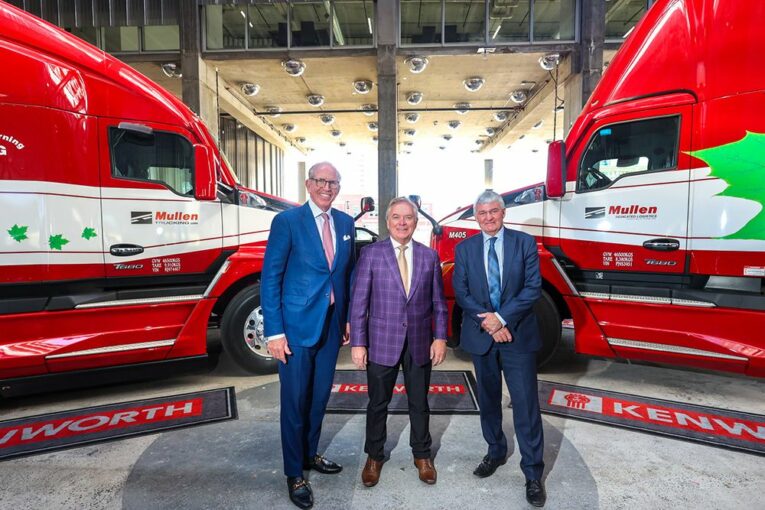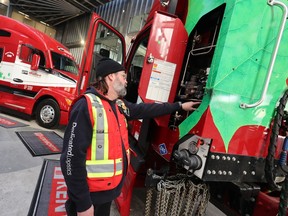
[ad_1]
The country’s largest natural gas producer is set to enter a new game, investing with a partner to build a network of compressed natural gas stations across Western Canada.
It marks another way that Canadian petroleum producers are looking to expand the market for natural gas, while also searching for ways to lower emissions.
On Tuesday, Tourmaline Oil Corp. unveiled an agreement with California-based Clean Energy Fuels Corp. to jointly build and operate up to 20 compressed natural gas (CNG) stations in the West, primarily serving heavy-duty trucks.
The $70-million joint investment will see the two companies commission the stations over the next five years, with an outlet north of Edmonton starting up recently.
“It creates a new growing market for low-emissions Alberta natural gas and an excellent opportunity to materially reduce emissions, first in Alberta and then across the country,” Tourmaline CEO Michael Rose said at a news conference Tuesday.
“It’s the next big step in replacing diesel with natural gas.”
Under the agreement, new stations are expected to start up in the first half of next year in Calgary, Grande Prairie and Kamloops, B.C.
The network will be operated by Clean Energy Fuels, which was co-founded by company CEO Andrew Littlefair and the late iconic U.S. oilman T. Boone Pickens more than 25 years ago.
Today, it operates a chain of nearly 600 CNG and renewable natural gas (RNG) fuelling stations across the United States, as well as 26 in Canada.
The investment will see the companies build the infrastructure that’s required to allow more heavy-duty trucks to use CNG, which has a lower carbon footprint than diesel or gasoline. A network of 20 stations could fuel about 3,000 natural gas-powered trucks a day.
Recommended from Editorial
-

Tourmaline, Clean Energy Fuels to partner on natural gas fuelling station network
-

Massive bus barn in north Calgary to house growing CNG-fuelled fleet
Rose said the Calgary-based producer isn’t moving away from its core production business, as Clean Energy Fuels will operate the stations.
“We just provide capital and gas volumes,” he told reporters.
“It makes us a little money. Does this make as much money as liquids-rich Montney horizontal (wells)? No. But does it make money? Yes, and it’s a really important thing to do and it’s about reducing emissions now.”
Littlefair expects the partners will have 15 stations built by 2026, “and we think that’s just the beginning,” he said.
“You need to have demand to justify building more stations. We know there’s plenty of trucking fleets that have shown interest already,” he said.
According to the partners, CNG-powered vehicles generate about 20 per cent fewer CO2 emissions than diesel trucks. Consumers can save up to 50 per cent compared to retail diesel prices on an energy equivalency basis, although the vehicles are more expensive to buy.
Okotoks-based Mullen Group, which has been operating CNG trucks in the province for more than 18 months, expects to use the new fuelling network as it shifts more of its fleet to natural gas.
Company president Murray Mullen said CNG is needed as companies and customers look to lower their emissions, although electric trucks will also play a role in the future, likely in shorter-haul transport.
“We are going to have electric trucks. We are going to have a lot of CNG trucks, and we are looking at every technology that’s available,” he said.
Mullen expects the company will double its investment in CNG-powered trucks every couple of years; by the end of the decade, he anticipates half of the vehicles it purchases will not use diesel.

The partners noted CNG infrastructure can also be used to dispense renewable natural gas, a biogas that comes from organic waste, paving the way for increased RNG demand.
In 2019, gasoline accounted for about half of all fuel used in Canada’s transportation sector, followed by diesel at 28 per cent and natural gas at five per cent, according to the International Energy Agency.
Several Canadian cities are using compressed natural gas to fuel some transit buses, including in Calgary.
Ian Archer, an associate director with S&P Global Commodity Insights, noted CNG has been available for many years and has some advantages — including lower emissions than diesel — but it faces competition from hydrogen and electric vehicles, while the engines are more expensive than diesel ones.
“You need to have some sort of ready demand before you just build a bunch of stations, and that’s why the Mullen (Group) piece is important in this,” Archer said.
Canada is the world’s fifth-largest natural gas producer and has massive supplies of low-cost resources, such as in the Montney formation.
Tourmaline has also been a major promoter of liquefied natural gas in Canada, which would create another source of global demand.
In January, Tourmaline began supplying natural gas to Cheniere Energy’s Sabine Pass LNG facility on the U.S. Gulf Coast, gaining access to much higher international pricing for its product.
Meanwhile, producers such as Peyto Exploration & Development Corp., Birchcliff Energy and NuVista Energy created Rockies LNG Partners, forming an alliance with Western LNG and the Nisga’a Nation to progress the proposed Ksi Lisims LNG Project in British Columbia.

Natural gas producers are seeking to uncover new markets for their resources as output increases.
It makes sense for Tourmaline to team up with Clean Energy Fuels, which has expertise in running a network of fuelling stations in North America, said industry analyst Patrick O’Rourke of ATB Capital Markets.
“Companies oftentimes don’t want to get over their skis, or outside of their sphere of competence,” said O’Rourke. “Things like that are aimed at extracting value and finding markets for supply.”
The country’s transportation industry is in the early innings of transitioning to low-carbon fuels, although the trend will accelerate as infrastructure, availability of vehicles and consumer demand grows, said Mullen.
“We all know that this is the right thing to do. And then we’re just going to figure it out,” he said.
“That’s what innovation is about.”
Chris Varcoe is a Calgary Herald columnist.
[ad_2]
You can read more of the news on source
